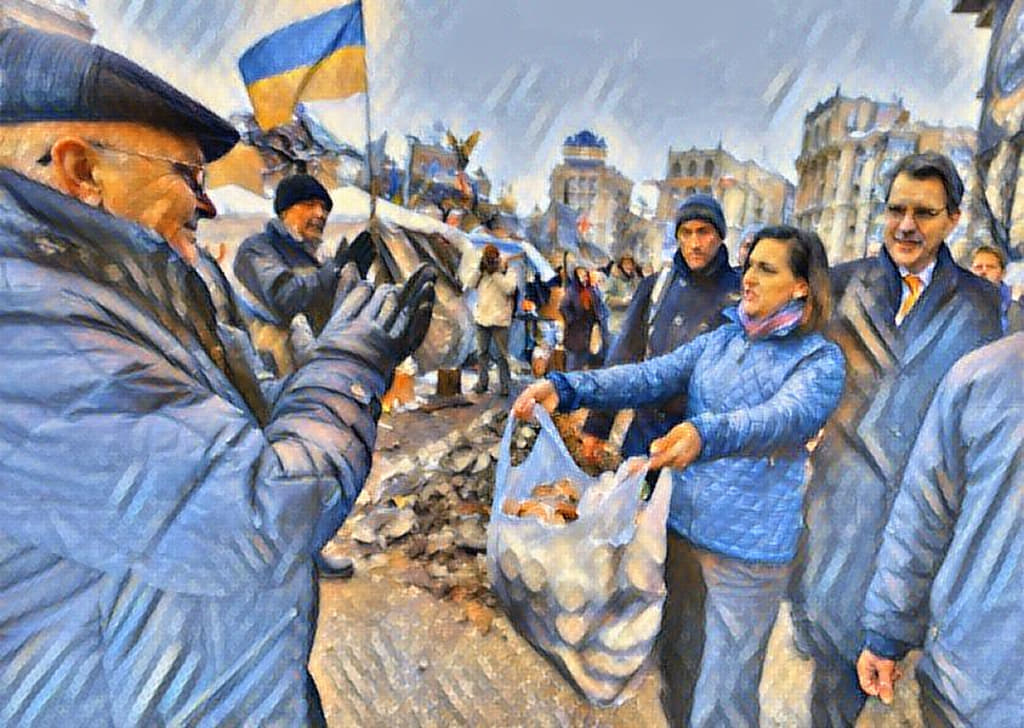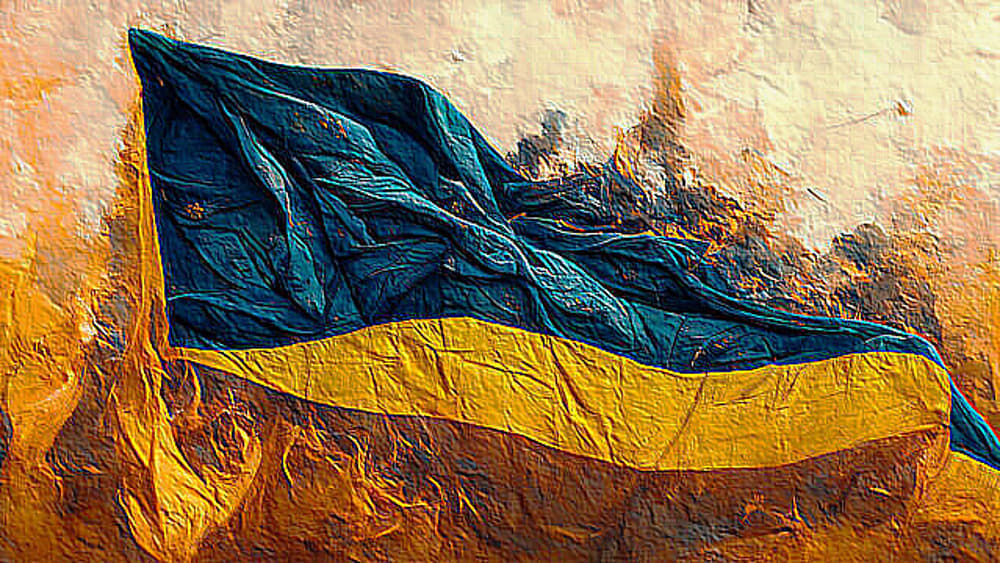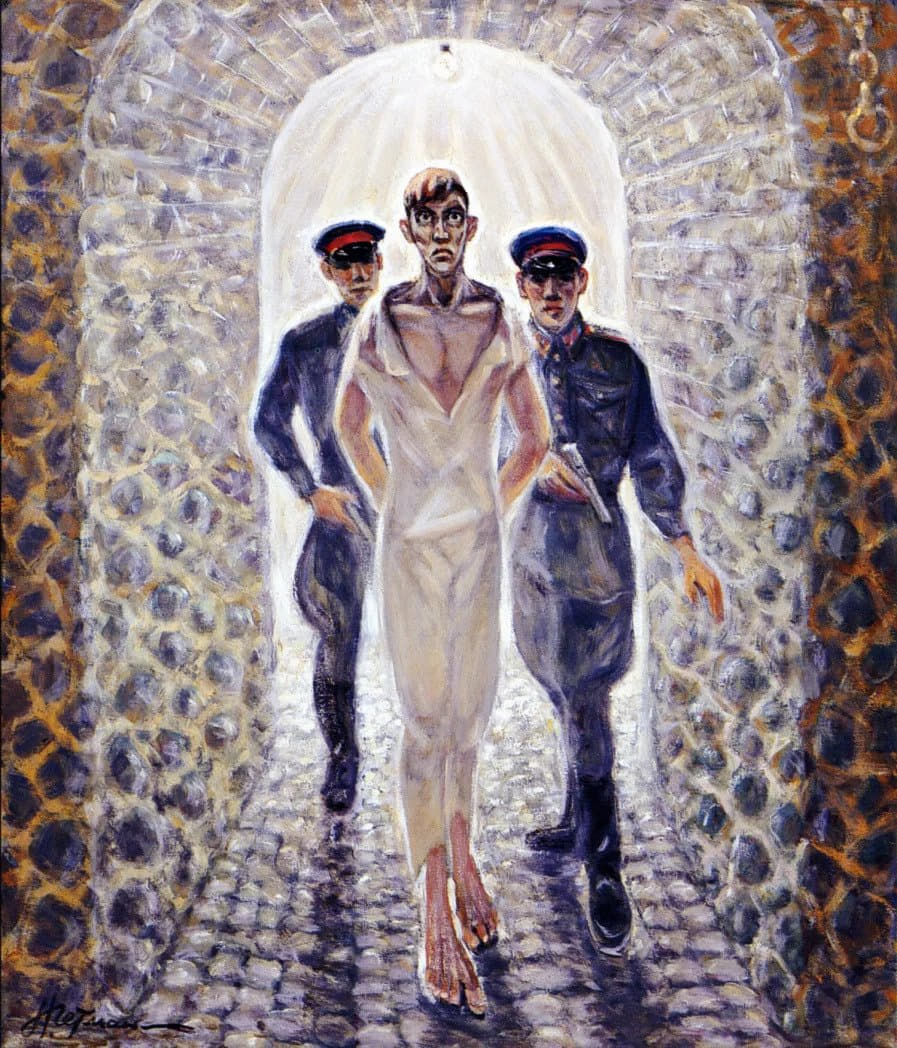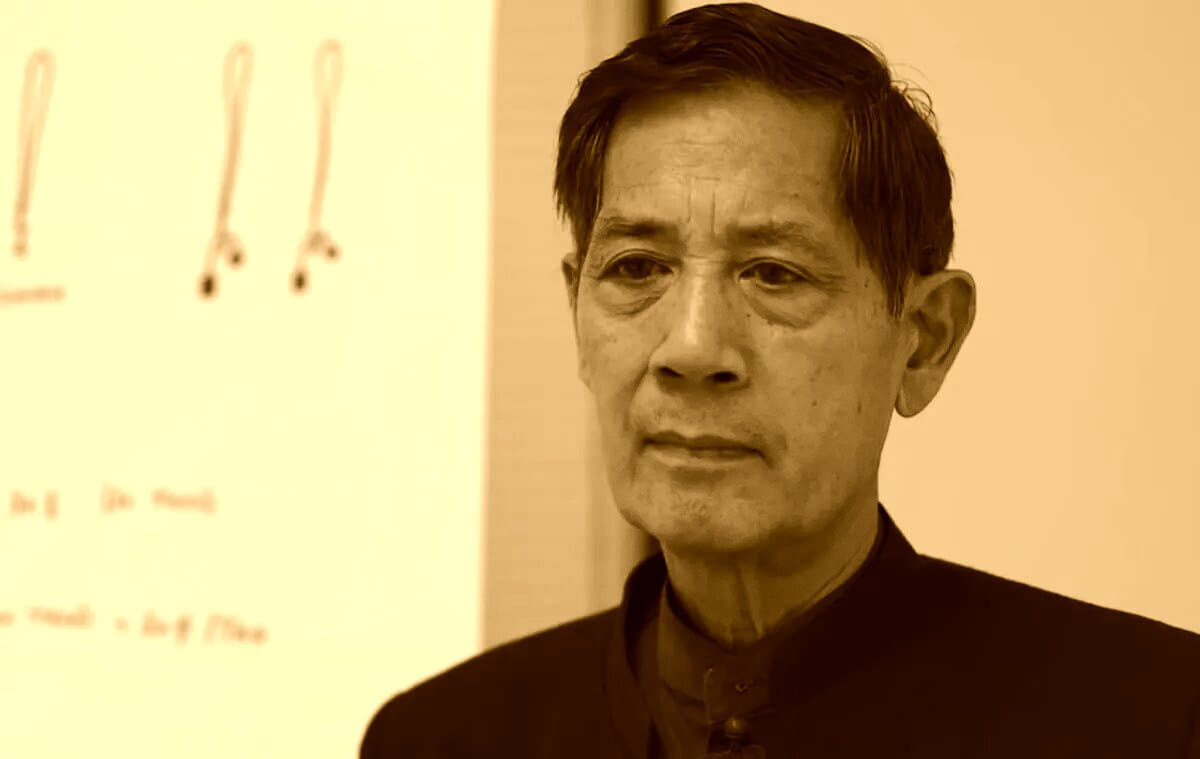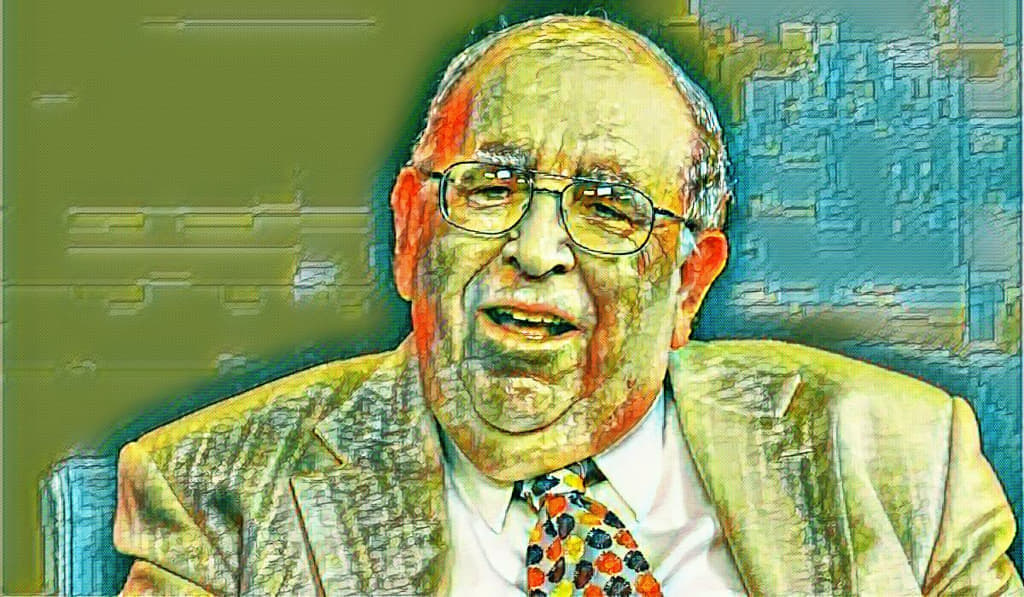🗣️ Ukraine is hosting one of the great epics of this century
— NATO (@NATO) February 23, 2023
❝We are Harry Potter and William Wallace, the Na’vi and Han Solo. We’re escaping from Shawshank and blowing up the Death Star. We are fighting with the Harkonnens and challenging Thanos.❞
[9/10] pic.twitter.com/HBji5RoWws
Images from the Munich Security Conference this February shew Odessa MP Alexei Goncharenko tenderly entwining a bracelet fashioned from spent ammo-cartridges round the wrist of Rep. Nancy Pelosi, and then pressing up against the motherly bosom of EU Commission President Ursula von der Leyen. (Now that I think of it, Goncharenko so much resembles the latter physically, might he be her eighth child? Just a thought.)
Safely ensconced on the other side of the Atlantic, Goncharenko’s alter ego, US civil servant Paul Massaro, has posted on his Twitter account a likeness of himself swagging with the Azov Bataillon flag—although his jubilant Hey, Look What I’ve Got! (sic) Tweet, thrusting the Stepan Bandera insignia sewn to his sleeve into the viewer’s face has, for some reason, vanished—though not before his admirers had immortalized it.
An alumnus of the National Endowment for Democracy and the Robertson Foundation for Government (its in-house slideshow portrays Secretary Anthony Blinken inter alia), Massaro is also a Hudson Institute associate.
That read and done, so to speak, one cannot but surmise that the “Paul Massaro” publicly-accessible webpages have been scrubbed of all clue as to his true mentors, sponsors and income-sources; the latter may well be substantial, given Massaro’s overseas trips, smart attire and gleaming array of teeth.
Paul Massaro: Statesman, Thinker, Banderovite
Whatever. Beamed from these “prestigious”, certainly official sites, the Massaro pages have apparently been drafted by their Subject Himself, so carefully crafted are they to glorify the polymath, workhorse and above all, statesman endowed with every gift of nature.
Thus we learn from the National Endowment for Democracy site that he serves the OSCE (Helsinki Commission ) as Senior (!) Policy Advisor at the venerable age of 32, with a portfolio including “topics such as anti-corruption, sanctions, finance, trade, Arctic issues, and energy security. He is also responsible for Mongolia and the OSCE Asian Partners for Cooperation (Japan, Korea, Thailand, Australia, and Afghanistan).”
Now, bearing in mind that a career diplomat of rank will not, as a rule, intervene into more than one or two major regions or policy areas, one inclines to the view that Massaro, with an MA from the Maryland School of Public Policy, and speaking only English and some German, cannot by any stretch of the imagination master “topics such as anti-corruption, sanctions, finance, trade, Arctic issues, and energy security. He is also responsible for Mongolia and the OSCE Asian Partners for Cooperation (Japan, Korea, Thailand, Australia, and Afghanistan).”
Dwarfing Foreign Minister Sergei Lavrov no doubt.
Accordingly, one would suggest that like Alexei Goncharenko, Massaro is a paid buffoon, deployed abroad to finger potential adversaries of Nulandia, while winkling out bounders, so sorry I meant allies, such as Anastasia Colosimo. The latter, a self-righteous little blonde aged all of 30 or so, has just been appointed advisor to President E. Macron in a diplomatic capacity, while lacking all experience in international relations. Miss Colosimo’s previous day job was as Office Manager to Mme. Sarkozy’s latest spouse at New York
Turning next to what appears, again, to be a Massaro Samizdat (self-published) page on the CSCE site, one encounters flattery that breaks all bounds.
Dixit the OSCE page, Massaro’s work “has advanced the recognition of corruption as a national security threat. He has been described in the media as ‘one of America’s foremost corruption experts’ and an ‘endless source of democratic ingenuity.’ His work has been similarly described as “breathtakingly prescient.” He has worked on over 13 pieces of counter-corruption legislation and facilitated the founding of the Congressional Caucus against Foreign Corruption and Kleptocracy and the Inter-Parliamentary Alliance against Kleptocracy.
“His work on the Rodchenkov Anti-Doping Act, a landmark law redefining doping as fraud… has for the first time held to account the authoritarian actors who use sport as a tool of foreign policy. His work on the Transnational Repression Accountability and Prevention (TRAP) Act was similarly groundbreaking, serving as the first-ever U.S. law to respond to abuse of INTERPOL by authoritarian regimes.”
Presented by Rep. Steven Cohen of Tennessee, the TRAP act’s explicit targets are Russia and similar recalcitrants—Azerbaijan, Kazakhstan, Tajikistan and Turkey—and its aim, to bring INTERPOL to heel—the US heel.
Alexei Goncharenko: From Russophile to Terminator
Born in 1980, Massaro’s alter-ego Goncharenko though actually a Russian-speaker, now affects the Ukrainian spelling Oleksyi and has succeeded, with which funds one knows not, to get himself elected MP for Odessa, a Russian city currently spelled “Odesa” in Nulandia.
Goncharenko came to fame or rather notoriety, for the bizarre role he played during the ritual sacrifice by fire of trades-unionists on May 2nd, 2014 at Odessa.
In his native city, what is said of Goncharenko would not, perhaps, be music to Vikki Nuland’s ears.
On September 20, 2021, a Ukrainian journalist, Sergei Shilov, penned a psycho-profile of this little thug for the on-line Klymenko Times, intitled “Oleksiy Goncharenko: Poroshenko’s parliamentary jester.”
Written in English, the article reveals some background to the disorders that define Goncharenko’s personality. He is one of the numerous progeny of Alexei Koktusev, MP from 1998-2001, former Mayor of Odessa, former Chair of the Anti-Monopoly Commission (2001-2008) and serial seducer, bouncing from one marriage to the next. According to reporter Shilov, on leaving the conjugal domicile, Koktusev left his own fecal matter in the breadbasket as a parting gift. Goncharenko was aged 3 at the time; this must have been a most edifying scene for a toddler.
After medical studies at Odessa, Goncharenko was somehow elected or appointed President of the regional Green Party, before leaving for Moscow to study economics (2002-2005). On his return, he became municipal Chairman of the Union Party (Soyuz), then headed by pater familias Koktusev. As a member of Soyuz, an overtly pro-Russian party, Goncharenko became favourably known to locals by pledging to grant the Russian language and its speakers equitable, official status.
From 2005 to 2013, now onto his third political party, the Party of Regions, Goncharenko continued to lobby for Russian-speakers, and succeeded – again, doubtless thanks to the pater who then owned television stations – to join Odessa’s municipal council as an opponent to the Mayor Edward Hurwitz, a self-described Ukrainian patriot.
Suddenly however, pater Koktusev returned to Odessa from Kiev, with his sights trained on Town Hall. Father-son oedipal battles ensued, with the police occasionally called in.
Cut to the year 2013, the year before the Maidan coup d’état. From a steady flow, US money swelled to a torrent (according to Vikki Nuland, the USA had invested $US 5 billion into Ukrainian politics), and Goncharenko’s fingers inched towards the butter on the sliced white bread.
For an outsider to unravel the labyrinth of Odessa’s ultra-corrupt politics is no easy thing. In a nutshell, then-President Yanukovich intervened to demand that the city’s Mayor, pater Koktusev, resign. Since that time, our attempts to trace Koktusev have proven fruitless – he seems to have evaporated (gone fishing, or to Russia?).
On 19th February 2014, as US winds blew to gale force, Alexei Goncharenko quit the Party of Regions to find, as Shilov explains, a new sugar daddy in the person of Pietr Poroshenko, soon to be President of the 51st US State, along with a brand-new identity as a fire-breathing Ukrainian “patriot”.
By 25th March 2014, Goncharenko was found parading in a PUTIN-HITLER T-shirt at Strasburg during the Council of Europe’s Congress of Regional Authorities. Two short months later, on 2nd May 2014, this Russophile and Russian-speaker was sighted sporting a smart little cap and a twisted smile, as trades-unionists were trapped and burnt to cinders in the Trades Unions House.
“The Kulikovo Field Has been Cleared of Separatists”
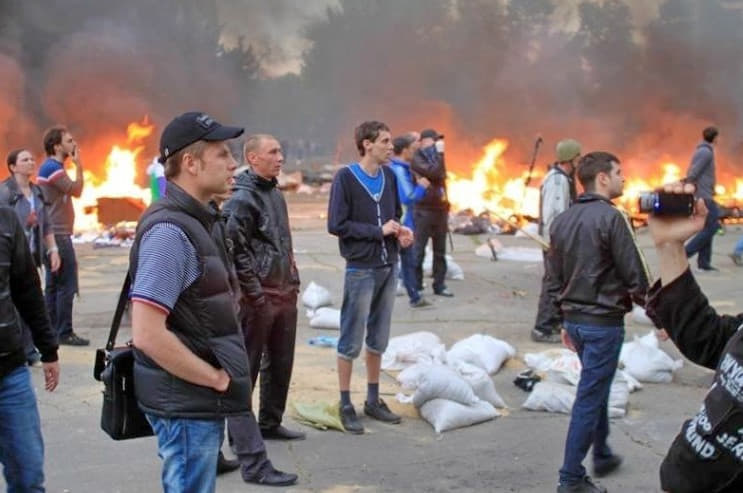
That same day, 2nd May 2014, a day of mourning for the guiltless dead, when mentally-healthy Ukrainians were reeling in shock and disgust, Goncharenko appeared on live television, to giggle that “the Kulikov Field has been cleared of separatists” (Shuster-Live). Thereafter, his every word made him hosts of enemies, save for Pietr Poroshenko and Co., who got him into Parliament for Odessa.
Sergei Shilov’s piece proceeds to set out a long list of variously puerile or repellent incidents involving Goncharenko, of which we shall report only one:
“… on September 7, 2021, the Verkhovna Rada met for an extraordinary meeting to consider address to the US Congress with a request to grant Ukraine the status of an ‘ally outside NATO’. The author of this idea was Aleksey Goncharenko, who collected 150 signatures of people’s deputies, but only 24 voted in favor. And it was not only that after the US left Afghanistan, the status of an “ally outside NATO” lost all meaning. The State Department itself spoke out against it, using its levers of influence in Ukraine to “dissuade” politicians controlled by itself from supporting this appeal…”
Since then, one finds Goncharenko everywhere—notably in England, or at the PACE Commission to which he was appointed Vice-President by “acclamation” (sic). Here, there, and everywhere—Goncharenko has only to open that gaping maw to reveal the extent of his psycho-pathology, the latest Make Russia Small Again podcast with fellow-buffoon Paul Massaro being a case in point.
Hush! Sadistic Clowns at Play!
And so, on the Massaro Method (sic) Podcast Make Russia Small Again (February 22, 2023, one hears Goncharenko utter the word bloodshed perhaps six times in half-an-hour – bloodshed, inevitable as Russia is to be carved up, Siberia thrown to the Chinese wolf, the Caucasus to revolt – bloodshed! Serbia’s goose will have to be cooked, since she acts as Russia’s Trojan Horse (sic), even were that to mean bloodshed. Fortunately Yugoslavia splintered, although at the cost of bloodshed.
How foolish a thing, says Paul Massaro, that some at Washington DC still balk at splintering Russia, fearful of unleashing a thousand times the Yugoslavian wars—bloodshed? No problemo! Hee-hawing like the ass he is, Massaro bares his row of giant teeth.
Press on!
Spilling the gut on his “father” fantasies, Goncharenko then portrays Russia as a maniac who kills women (sic !), “it’s a hunger” he says, a maniac who will go on and on if not halted. Russia cannot stop, she will invade, she threatens the entire world. She will throw herself on Moldavia, she’s spent millions to subvert Moldavia. Russia is the last empire left standing, all the others have happily been dismembered—the Ottomans, the Germans—and now Russia’s turn has come. Her weak link: the non-Slavic peoples, who must be stirred up into revolt. Chechenya and Daghestan must join NATO.
The two buffoons agree on one further, not inconsequential point: do not expect the Russian people to rise up against their President. Indeed, says Goncharenko, since but 10,000 of Moscow’s ten million inhabitants ever demonstrate against him, Vladimir Putin must be overthrown by exploiting every crack in his entourage, while closing every sanctions loophole. Neither can repress their Schadenfreude as Massaro cackles: “at least, the Germans are no longer buying their natural resources [sic] from Russia. You’ve gotta starv’em out!” Natural resources, yeah.
In a word, these individuals are sycophants, propitiators out for the main chance. Neither are possessed of any inner strength – their entire being is premised on propitiating whomever they perceive to hold the key to power and money. The moment power passes elsewhere, they will hasten to switch sides.
A buffoon is amusing, only when his master is not murderous. These buffoons’ masters are in the business of getting others killed.
Now, Goncharenko will likely come a cropper at the hands of Someone whose toes he has trod upon once too many – amongst Massaro’s Banderovite heroes there’s no lack of such Someones. Thieves DO fall out. As for Paul Massaro, if things go belly up with the Banderovites, he’ll ply his networks right lift and centre for a lucrative post retailing gibberish in the Ivy League, tucked up all safe and warm in the US of A.

And A Message from Dr. Sherwin Nuland né Nudelman, Vikki’s Pater Familias
Amongst the buffoons’ managers, one suspects Under-Secretary of State Vikkie née Nudelman Nuland, In 1995, her father, Dr. Sherwin Nuland né Nudelman, surgeon, wrote a best-seller on—you guessed it—DEATH, intitled How we Die. Very strangely, although by the year it appeared cancer treatment had made such strides that a diagnosis no longer meant a death sentence, Dr. Nuland fairly revels in the sheer wantonness of cancer, and in a way that would nicely fit our two Banderovites:
Cancer. “The disease pursues a continuous, uninhibited… barn-burning expedition of destructiveness, in which it heeds no rules, follows no commands, and explodes all resistance in a homicidal riot of devastation. Its cells behave like the members of a barbarian horde run amok…
“…the uncontrolled mob of misfits that is cancer behaves like a gang of perpetually wilding adolescents…. There comes a point at which home turf is not enough—offshoots of the gang take wing, invade other communities, and, emboldened by their unresisted depredations, wreak havoc on the entire commonwealth of the body. But, in the end, there is no victory for cancer. When it kills its victim, it kills itself. A cancer is born with a death wish.”
Charming, I’m sure.
By the way, and lastly—as a Jew, I must ask: how comes it that Jews like Victoria née Nudelman Nuland or Anthony Blinken, Jews of Slavic origin no less, have sold their soul to overtly-Nazi killers? Mendelssohn Moses has attempted an answer here.
Mendelssohn Moses writes from France.
